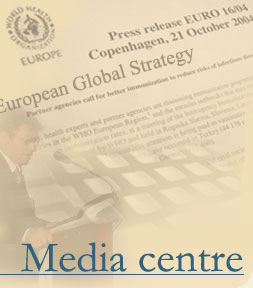HIV in Eastern Europe - a rapidly closing window of opportunity
United Nations agencies call upon all European Heads of State to take the lead
Copenhagen • Geneva • Brussels • Stockholm
“Intensified action and stronger support are essential from all European countries if the AIDS epidemic is to be turned back,” said United Nations agency heads in Europe in a statement to be issued in Copenhagen later today.
“We know the situation, we know what works. Now is the time for massive support and action from all countries and the international community,” according to a message issued jointly by Dr Marc Danzon, WHO Regional Director for Europe, Mr Philip O’Brien, UNICEF Regional Director for CEE/CIS and the Baltics, and Dr Olavi Elo, UNAIDS Director for Country Planning and Programme Development.
The message is being issued in the wake of alarming new data that points to an exploding HIV epidemic in eastern Europe. To confront this mounting challenge, 80 representatives of United Nations agencies and other international and bilateral organizations met on 4 and 5 December at the WHO Regional Office for Europe to discuss what they could do to keep HIV from spreading in the region. Central to their discussion was how to engage top-level political support against AIDS and prevent a catastrophe from taking place in eastern Europe.
“Political will and leadership are key,” the statement said. “Today we call upon all European Heads of State to utilize their national New Year’s messages to declare their support for an action plan to stop this epidemic in their own countries, in Europe and beyond.”
“Leaders of parliament, communities, religious groups, corporations, towns and cities, ministers of finance, health and youth, renowned artists and intellectuals – all must engage in mobilizing to support this effort.”
According to the AIDS Epidemic Update released last week by UNAIDS and WHO, the estimated number of people living with HIV in eastern Europe has increased to 700 000 from 420 000 just a year ago.
Most new infections are among injecting drug users. Experts warn that a second wave of HIV infections spread by sexual contact could follow the current drug-driven epidemic and lead to a generalized epidemic in just 3–4 years.
Two decades into the epidemic, some clear lessons have been learned about what works and what does not. Well documented examples, both globally and in the European Region, indicate that immediate practical steps in affected countries should include establishing and enforcing policies that would allow for:
- harm reduction programmes, such as needle exchange for intravenous drug users;
- treatment of sexually transmitted infections (STIs) at general practice/family practitioner level; and
- social support for vulnerable young people, behavioural change programmes and condom promotion campaigns.
In some countries, sexually transmitted infections have increased 50- to100-fold in a decade. Strengthening prevention and management of STIs, particularly through training and support to family practitioners, can successfully reduce the spread of HIV.
Young people in eastern Europe are particularly at risk, reflecting instability in the wake of the rapid social and economic changes.
The international community has an important role to play. It can help mobilize national resources, train personnel, and provide technical guidance as needed. Many countries, particularly those most affected – such as Belarus, Kazakhstan, the Republic of Moldova, the Russian Federation and Ukraine – lack experience and expertise in this field.
“We have a unique chance to contain the epidemic through early, carefully targeted and well coordinated national action strongly backed by international agencies,” said the United Nations statement. “The present generation of children and young people in eastern Europe is a generation in jeopardy. Africa once had 400 000 HIV-infected people. It now has nearly 4 million. Our window of opportunity is not yet closed. We must act now.”
For more information, contact:
|
Sexually Transmitted Infections/HIV/AIDS |
Communication and Advocacy WHO Regional Office for Europe Scherfigsvej 8, DK-2100 Copenhagen Ø, DK Fax: +45 39 17 18 80 E-mail: fap@who.dk or ana@who.dk Young People, Health, Development and Protection |

